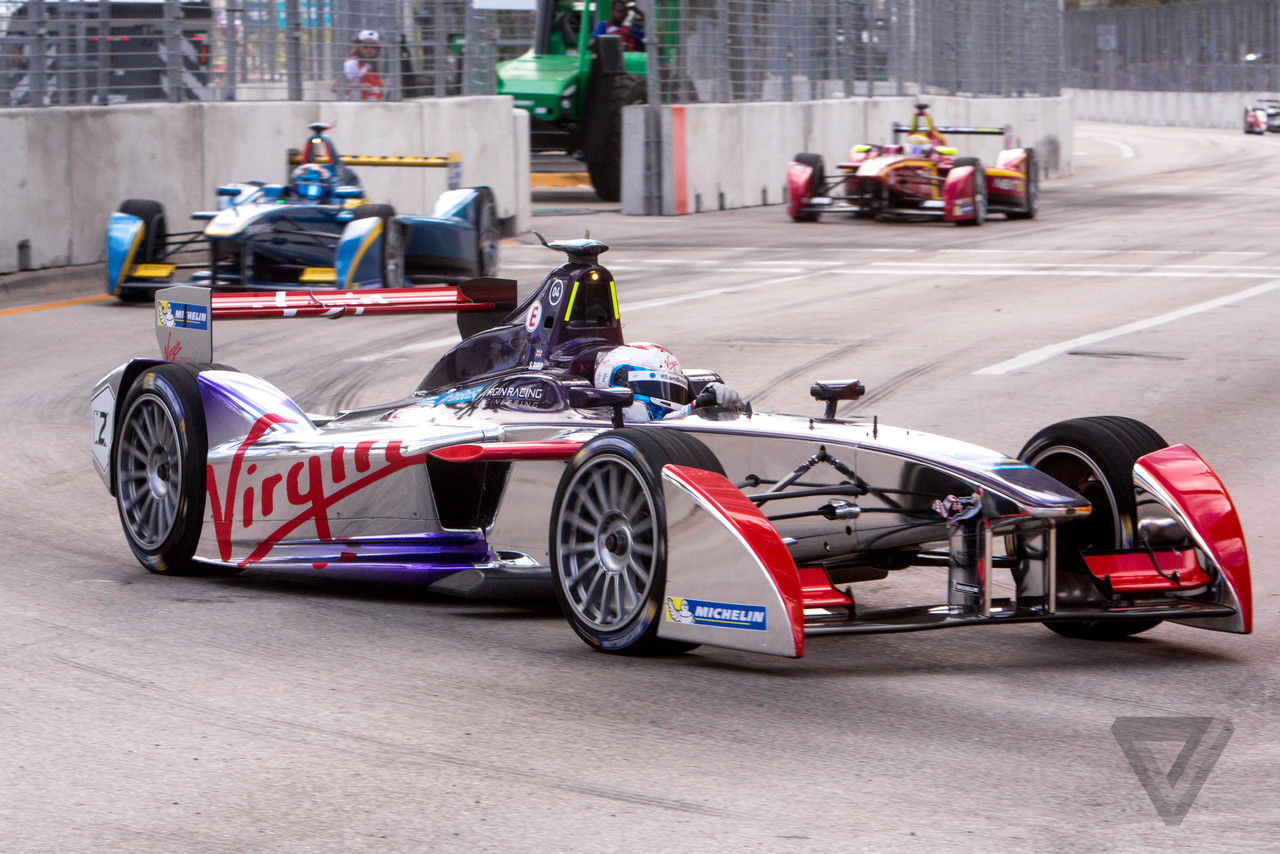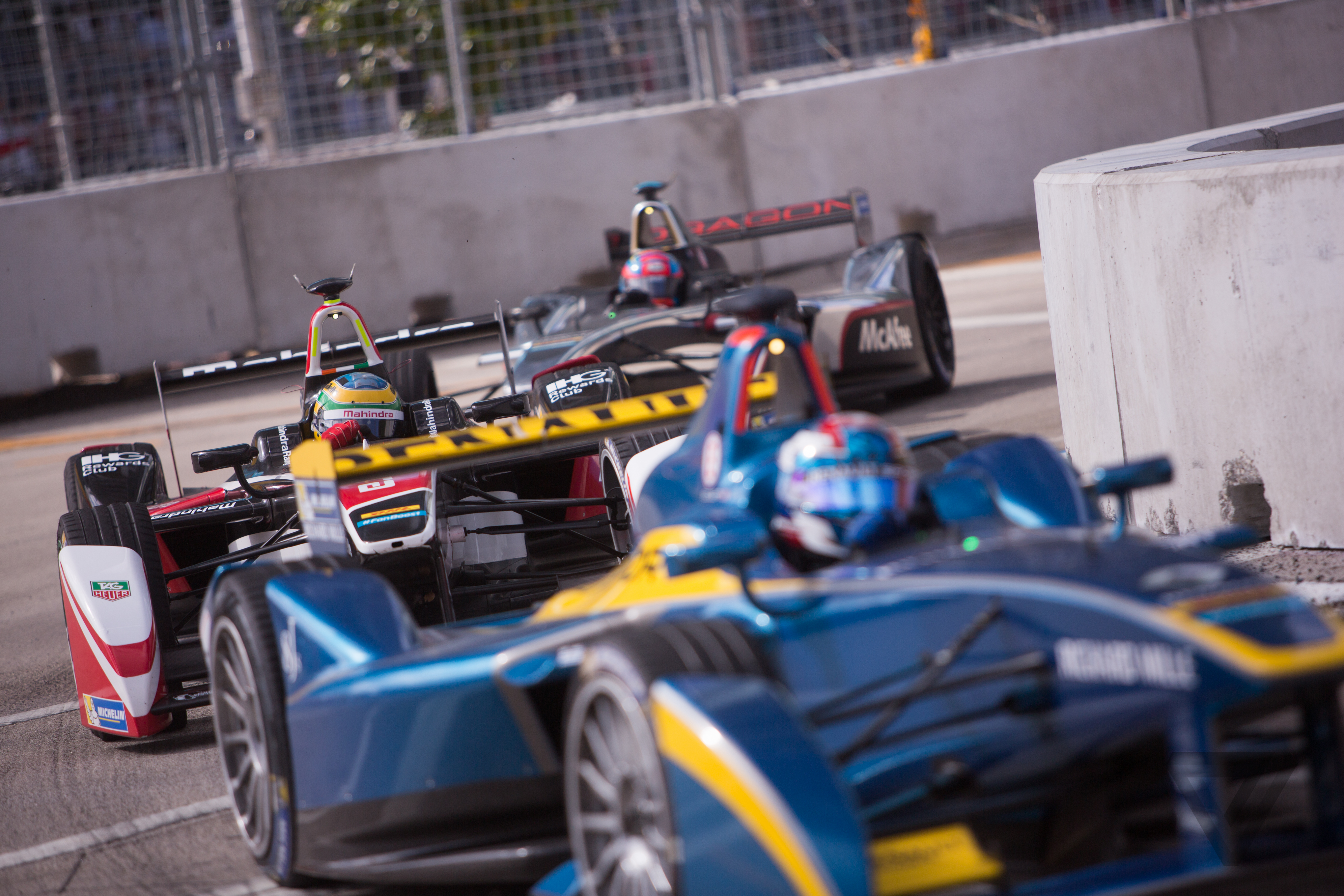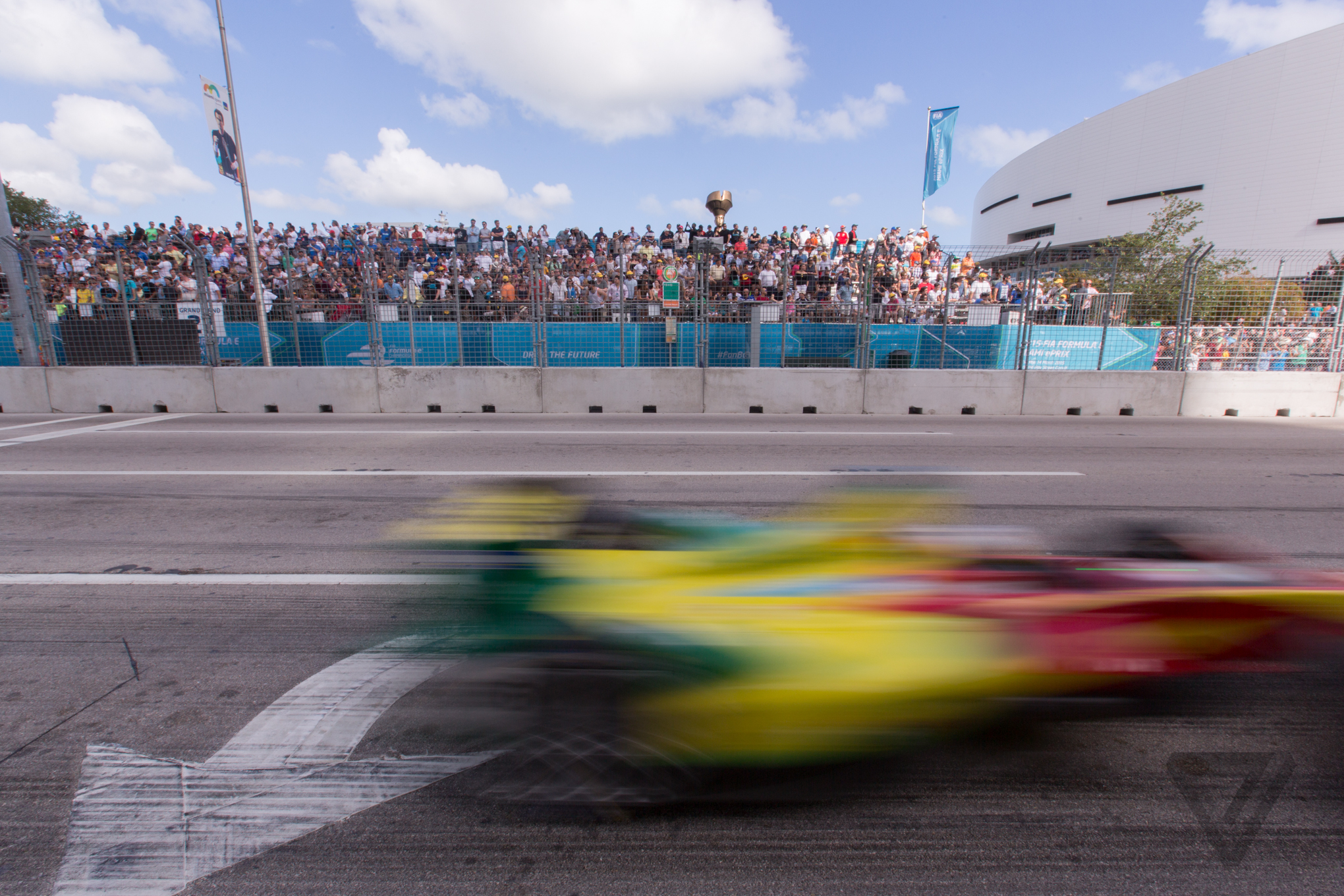The first season of all-electric Formula E racing was the start of something awesome
The brand new series is one to watch
40
This past weekend, the world’s first major all-electric racing series completed its inaugural season with a pair of races in London. It was a rather grand conclusion to an exceptional first season for Formula E, and the EV series looks destined for more. But I can’t stop thinking about the series’ first race.
I stayed up until 4AM on a Saturday morning last September to watch the debut of Formula E from my couch. The brand new racing series was making its debut in Beijing, and an overnight broadcast wasn't going to deter me. I've loved racing since I was young, and I had to see what this crazy new series was like. And by the end of the race I had forgotten the close quarters of my New York City apartment and was in full throttle, screamy sports fan mode, because on the very last turn of the very last lap of the first race in the history of Formula E, something incredible happened.

The race, until that point, had just been pretty good. But the last few laps were intense. Nico Prost, who led from the start, had Nick Heidfeld breathing down his neck around every corner. Heidfeld had an ace up his sleeve: he saved just a little more battery power than Prost did throughout the race. Maybe it was because he wasn't in front pushing dirty air, maybe it was because he used the car's regenerative braking more effectively; either way, he had an edge. He used that extra power to push by Prost before the pair got to the final corner — a move he tried and failed at the lap before. Prost saw the attempt in his mirror, hesitated, and by the time he tried to block the attempt, Heidfeld was almost by him. He cut hard to the left, clipped Heidfeld's car, and sent him careening into the wall of the final turn. Neither man won the race.
Formula E isn't shy about posting highlights and large chunks of its races on YouTube and Facebook, a practice Formula One has been slow to adopt.
I leapt to my feet during all of this, shouting loudly enough to wake the neighbors above and below me. But the most surprising part of this was my brother, nowhere near a sports fan, yelling alongside me. He had made it home from his shift at the local beer garden right before the race started and, for some reason, listened to me when I convinced him to join me in watching. "This is history! They're completely electric! It'll be over quick, you can't go to bed!" He shrugged, cracked a Budweiser, and obliged me. One hour later, he was right there with me, mouth agape at the fantastic racing happening on our screen.
One of the best things about Formula E: the races are short
The duration is important, and it's one of the foremost reasons I believe the series is headed for healthy success: it has an opportunity to attract an entirely new demographic of fans who are short on time and attention. Formula E races last, at most, one hour. If I had tried to convince him to watch one of NASCAR's four-hour marathons or even a relatively trim two-hour Indy Car race, he would have just gone to bed.
For that, I have a reason to thank — not curse — the limitations of battery technology. The 200-kilowatt batteries in each Formula E car can only last around 25-30 minutes, which necessitates shorter competitions.
Even better, the brevity improves the experience at each track. Formula E doesn't demand an entire weekend's worth of travel, camping, and time spent baking in the sun on molten-hot bleachers. Hell, for some races they didn't even charge for admission. The FIA knew it needed to bring as many eyeballs to Formula E in its debut season, and it made some shockingly wise decisions on how to do that the right way.
That's a shock because, in many respects, the FIA’s flagship series is a bit of a mess. Formula One is constantly involved in one controversy or another, whether it’s smaller teams literally begging for help because they can't afford to compete, or Red Bull, a main team sponsor for years, threatening to quit. The turmoil also comes at a time when rumors are flying that a group of investors is planning a takeover of the series.

The common complaints about Formula E from traditional race fans are immaterial, like the fact that the drivers have to switch cars in the middle of the race. That's just a temporary limitation of the battery tech — right now it's just too unsafe to try to quickly swap the car's battery. Besides, the two-car approach provided a lot of great drama this year. Drivers who may have banged up their first car kept pushing hard, knowing there would be a fresh one waiting in the paddock in just a few laps. Chances at redemption were built into each race at a core level.
Then there’s Fan Boost, where the top three drivers in a pre-race fan vote win two short bursts of power during a race. It’s one of the first complaints from traditionalists about the new series, but in truth its impact was minimal in the first season. The street courses are so tight that drivers often didn’t have room to use them and, when they did, it often put too much stress on their entry into a corner or it gained them little ground.
Perhaps the biggest thing standing in the way of Formula E is that the popularity of many major racing series is suffering. NASCAR's ratings are down, its attendance is in freefall, and while the races are still fun, the series can't stop itself from alienating fans every year by continuously changing all the rules. IndyCar is struggling to keep up with what popularity NASCAR does have, and its own attempts to stay relevant keep backfiring. Formula E making a great debut right now is a bit like showing up to a dinner party and discovering everyone already ate.
"We have to look at this as a different type of racing."
When I covered the Formula E race in Miami, I asked the drivers if they thought the series would ever appeal to the hardcore American racing fan, the one complaining about the lack of engine noise and the absent smell of burning fuel. Scott Speed practically cut me off before I finished the question. "No," he said. "It’s a global series. This thing is different."
Team owner Michael Andretti agreed with him. "We have to look at this as a different type of racing," Andretti said. "You can’t come in with the same ideals."
Then, Lucas di Grassi echoed the case that series CEO Alejandro Agag has made since Formula E was born — that it's all about kids. "When [the younger generation] thinks about buying their first car, they'll think about buying an electric car," he said.

Formula E also holds an electric kit car competition before its main races in an effort to get kids involved.
The argument is that if kids grow up with fewer fossil fuel-powered cars, it seems likely that they'd be turned off by the idea of a racing series that glorifies them. They'd gravitate toward a series like Formula E. By then the series won't be so experimental, and should be even better. And while the worldwide shift from gas to electric is changing at an immeasurably slow pace, the adoption of electric vehicles at least seems possible thanks to companies like Tesla.
Richard Branson put this all more bluntly during the press conference in Miami. "Unless you have sports like this, we’ll never get to a world that’s carbon-neutral by 2050," he said. "I hope 10 years from now, 20 years from now, the smell of exhaust will be as much a thing of the past as the smell of cigarettes in a restaurant."
Branson, predictably, hasn’t shut up about Formula E. At this weekend’s season finale, he told the media he believes Formula E will overtake Formula One's popularity in four years. This is where the real fun begins. Branson’s comments riled up many inside Formula One. The 2009 series champion Jenson Button fired back at Branson, saying, "Formula E is a good addition to motorsports because that will be the electric series and the rest of us can get on with motor racing." Infiniti Red Bull’s team principal Christian Horner said the Formula E cars "look slow," and that they’re more of a competitor to one of F1’s feeder series’ like GP3. Whether you agree with them or not, Branson’s bravado got them both talking about Formula E.
Having people like Branson and even Leonardo di Caprio involved is another reason to believe in Formula E, but more importantly the sport already has a lot of support from established automotive names. The Andrettis, the Prosts, the Renaults, and the McLarens of the racing world aren't going to waste their time with a series they don't believe in. The idea that Formula E is ahead of its time, that it's a series the people of tomorrow will love and embrace, if all of that really is the case, then it just has to hang around for a while.
That seems completely possible. Formula E has money behind it, and putting a team together is nowhere near as expensive as it is in Formula One. The series held races in beautiful and diverse venues, running street courses in places like Sao Paulo and Russia. They even competed on hallowed racing ground with an event in Monaco. And mayors of other cities around the world are begging to host a race.
More importantly, the competition in Formula E's debut season was excellent. The races were thrilling, and only three drivers won more than once. The first season's points championship even came down to the last lap of the last race, with Nelson Piquet Jr. beating Sebastian Buemi by one point.
That competition has hooked some of these drivers, which might be the most important part of Formula E's near future. Just watch this interview with Buemi after the final race in London. He's dejected. He's pissed at Bruno Senna for blocking, because that one position cost him the trophy. Buemi is a WEC champion, has competed in Formula One, and run the 24 Hours of Le Mans, but he hates that he lost the first championship in this new series that might not amount to anything.
Now watch the interview with Piquet. He's elated. He's speechless. Piquet has hopped from series to series his whole professional career, but he raced in all 11 Formula E races. He survived all except one — not an easy task, almost every regular driver had at least one DNF — and you can tell he's proud that it won him the title.

Formula E is young, but it already has the makings of a lasting series. The competition is great, and it has a killer rotation of young drivers who already care about winning a race. (Even Button agreed with that. "The drivers are making that series," he told The Guardian.) It has a global interest. It has high-profile cheerleaders like Richard Branson. The battery technology that makes it all happen is only going to get better, and is already innately cool. Watching a Formula E race is awe-inspiring — even after 11 races I found myself wondering, "How is this even possible?"
Formula E is also simple. The races are short, and the cars are evenly matched, which naturally breeds competition. That leaves less of a learning curve for new fans, and the sport doesn't require any major investments of time or money from those who are curious. Now it just needs its fans to keep watching, and maybe a few more brothers or sisters will join them on the couch.
Correction: This post originally stated that an investment group is interested in buying FIA. The group is actually rumored to be buying Formula One.